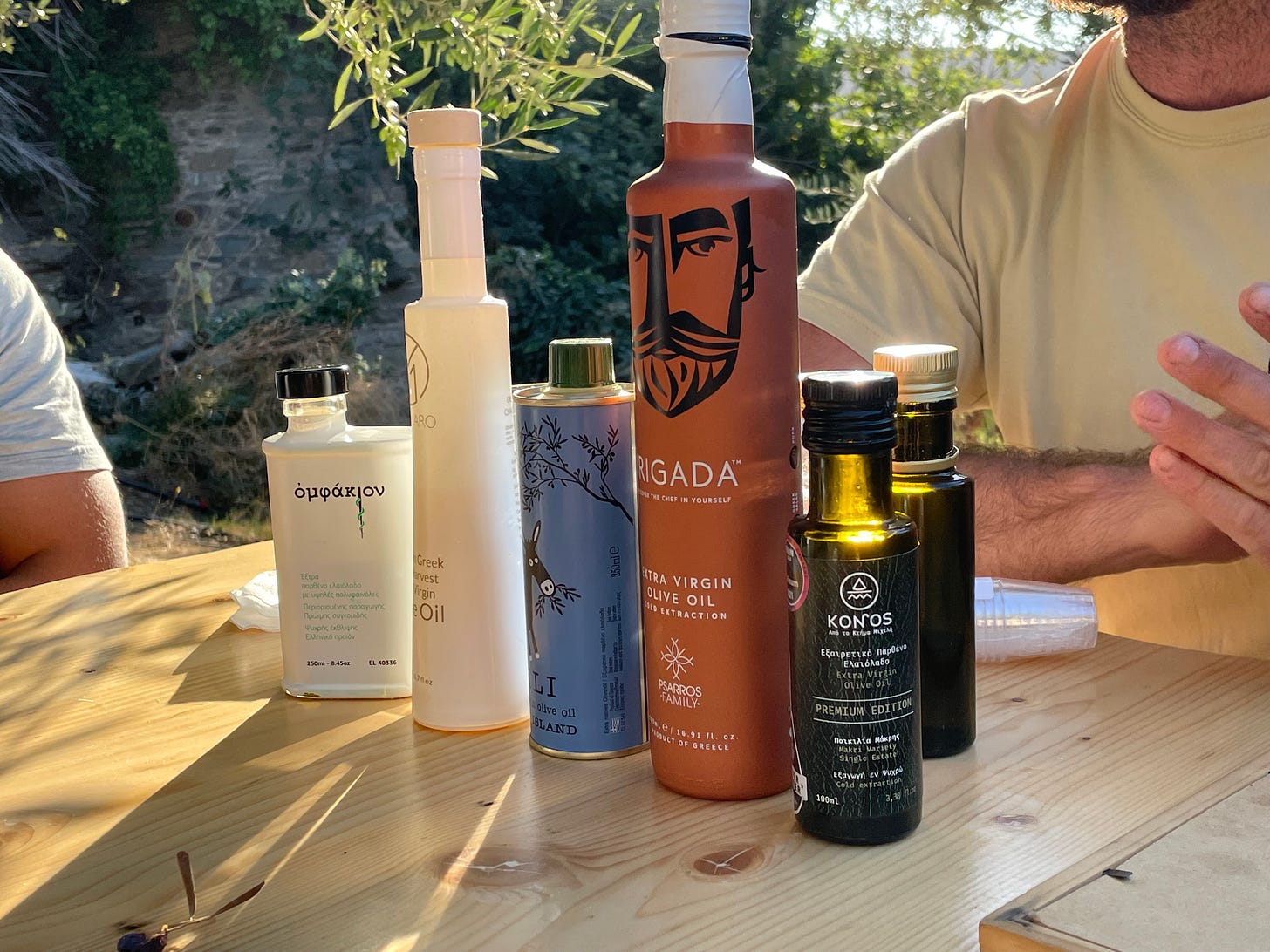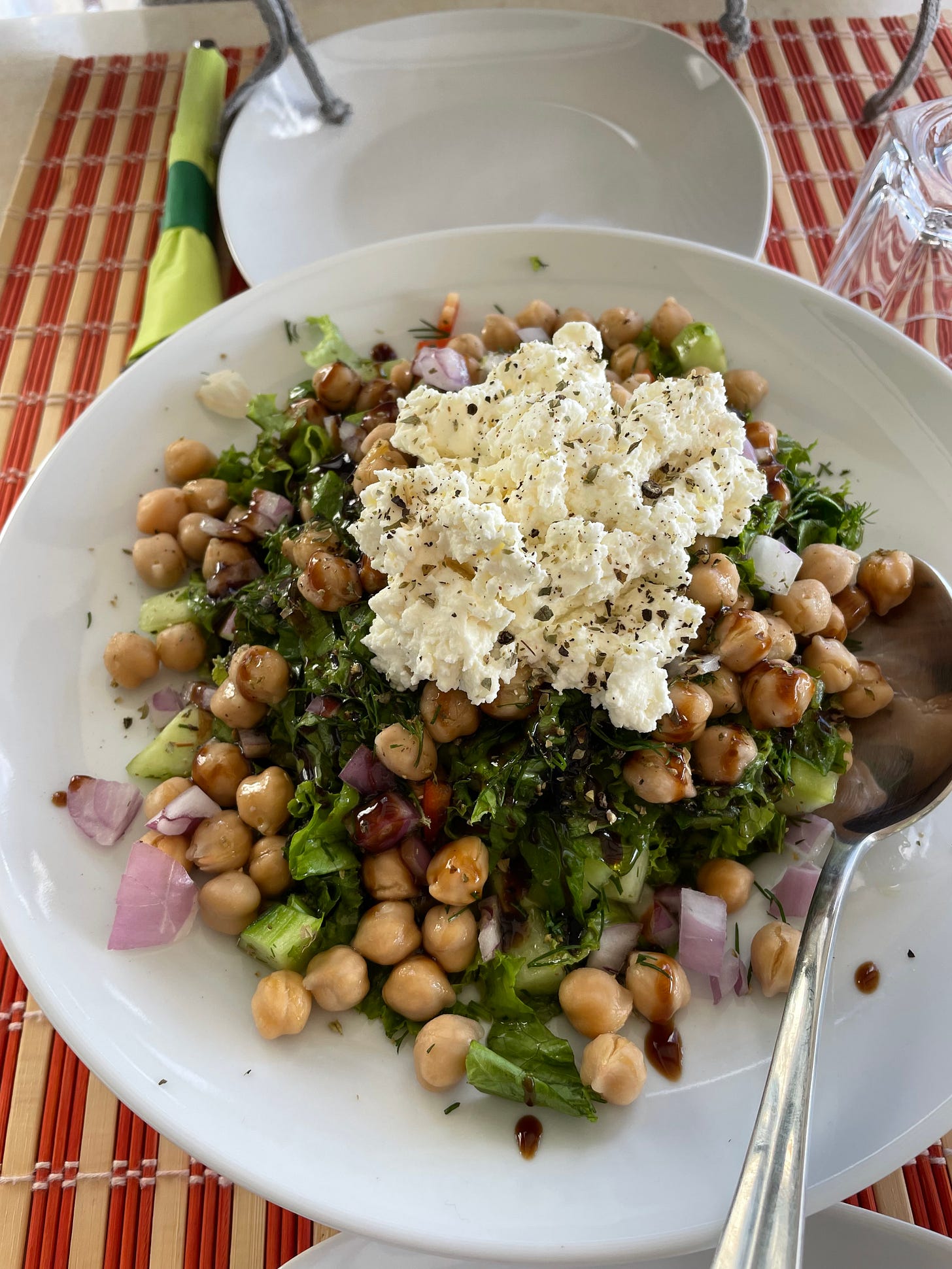The Grecian Diet: Foods Found at Every Meal
A peak into why those in blue zones live such long, healthy lives
Now that I’m back from my 2-week-long trip to Greece, I’m really missing the food. Normally I feel sluggish and like two bricks are taped to my shoes when on vacation. But this trip was different.
I was eating the highest quality extra virgin olive oil with every meal instead of the inflammatory vegetable oils that are so common in America.
The veggies were fresh and seasonal, not imported hundreds of miles just to end up on my plate.
The lamb and goat that I ate were roaming pastures not too long ago, living as animals are meant to live. They weren’t raised by the hundred in a packed warehouse, feeding off corn and grain and who knows what else.
There was a reason I felt vibrant and full of life my entire vacation! I barely felt any signs of jet lag because of how the fresh food diet made me feel.
Now, Greece contains an island called Ikaria which is considered a blue zone. If you aren’t familiar with the blue zones, these are regions around the world where life expectancy is extremely high. People die from old age rather than from excruciating diseases like cancer, heart disease, and dementia. Many people attribute this to the mostly plant-based diet the inhabitants seem to eat, but I beg to differ.
I believe it’s due to eating with the seasons and connecting with the animals that provide them with a nourishing food source.
When I was in Greece, I noticed certain foods that were never present in the meals. I also noticed foods that repeatedly snuck their way into breakfast, lunch, and dinner. In this article, I want to share the foods that were and weren’t common while I explored Athens and the islands of Naxos, Santorini, and Milos.
WARNING: You are about to see pictures of very delicious food. You may start salivating. I recommend having a full belly just in case 😉
Capers
I’ll occasionally cook with capers if a recipe calls for them, but I would never have considered them a staple in my diet. In Greece, almost everything has capers. They’re almost just as important as salt or pepper! Capers are actually undeveloped flower buds that grow wildly in the Mediterranean region. After being picked, they are typically cured in salt or pickled, giving them the rich salty flavor that we know.
Capers are high in sodium (which isn’t always a bad thing), vitamin K, copper, and antioxidants like quercetin and rutin. One study tested the effects of caper extract on the blood sugar levels of diabetics and found that it prevents blood sugar spikes.
I was able to buy a large bottle of local dried capers to bring home with me in my luggage. I already used them last night in some salmon enchiladas that I made. So delicious!
Extra Virgin Olive Oil
When I say everything I ate was swimming in olive oil, I’m not overexaggerating. Extra virgin olive oil is used generously in every dish. Whether it’s a salad, some type of meat, or tzatziki. The dish is not complete until you can taste the high-quality oil's dark, peppery taste. Sebastian recently wrote an article on the benefits of extra virgin olive oil. Make sure you give it a read if you haven’t already.
Oil actually isn’t bad for you when it’s the right type. It can have a lot of great benefits, especially for your brain. When the bad oils we typically cook with like sunflower oil, canola oil, and grapeseed oil are replaced by ones high in antioxidants, our health can flourish.
Tomatoes
Now, there could’ve been tomatoes in everything because they were currently in season (which is another point in itself), but they were in almost every meat and vegetable dish. On my first night in Greece, I ate mussels and feta in tomato sauce. On the second day, I ate stuffed tomatoes with beef and eggplant. On the third night, I had a salad full of tomatoes!
While tomatoes are best eaten seasonally, there are a lot of benefits despite getting a bad rap for containing lectins and being a nightshade vegetable. Tomatoes are high in a particular antioxidant called lycopene, vitamin C, potassium, and folate.
Local and Minimally-Processed Dairy
Local and minimally processed are key here. You won’t find cheddar cheese or mozzarella string cheese in Greece. Most cheeses are soft, sour cheeses made from sheep or goat’s milk.
Xinomyzithra is a cheese traditional to the island of Naxos. It is made by adding rennet to fresh goat milk (must be milked in the last 24 hours) and put in containers to ferment. No heat is added to it so it retains all of the beneficial bacteria and must be eaten within a few days. Dairy isn’t meant to last months on a grocery store shelf! It also isn’t meant to be pasteurized to the point where none of the beneficial bacteria is present.
When I took a cooking class at Elitlithos, we used fresh sheep’s milk yogurt that was made just 1km away by the owner’s brother. You can read more about my experience at the 100% sustainable hotel here.
Tzatziki
I’ve already shared with you the recipe and tips and tricks for making the best tzatziki, but I never shared just how often it was served at restaurants. Tzatziki is like bread at an Italian restaurant. It is the staple welcome treat for any meal in Greece.
It wasn’t uncommon for the waiter to bring me a dish of tzatziki as soon as I sat down at the table. Not to mention, sometimes they didn’t even bring you bread with it. It’s so fresh and delicious that you can eat it by the spoonful! No bread is required.
My friend and I were pondering this at dinner one night- As Americans, we eat sugary yogurt by the spoonful but not savory yogurt. Why is that? Yogurt is a great protein source and quite delicious when paired with fresh herbs and vegetables. Let’s normalize tzatziki by the spoonful as a snack!
Wild-Roaming Red Meats
Rarely did I see chicken being served at restaurants. The meats were mainly goat, lamb, and beef- all red meats. They were animals local to the land, not imported from another country. Not to mention, when you drove by fields, it wasn’t uncommon to see packs of goats roaming the mountain freely. In America, our cows are raised in awful conditions, packed tightly together, not even saying daylight or getting the opportunity to graze the land. This raises their cortisol, producing meat that isn’t as nearly nutritious for us.
Animals that freely roam the land live a healthy, happy life. They aren’t stressed and they are eating the foods that Mother Nature intended them to eat. In turn, they are much more nourishing for our bodies as well.
Fresh Seafood
Again, Grecians don’t import their meat. They don’t raise it in a special way just to kill it. The seafood served to you is all freshly caught from the Aegean sea. There are no fish farms where the fish are packed together in unhealthy living conditions.
Seasonal Produce
As I mentioned with the tomatoes, people in Greece eat with the seasons. They don’t import fruits and vegetables from other countries where that food can grow. They plan their meals around what’s in their garden. While on a tour at an olive oil farm, the farmer made us dishes, each using all ingredients from his garden. Eggplant dip, fava bean, greek salad, and beet dip. It was some of the best food I’ve ever had!
When we eat seasonally, we are supporting our local communities rather than large corporations. We are eating foods with much more nutritional value since they aren’t bred for a long shelf life. We are cutting down on fuel emissions transporting our food miles to end up at our grocery store. You can read more about the journey your food entails to land on your plate here.
Slow eating
Lastly, nobody rushes meals in Greece. The service times are a lot longer because waiters won’t try to push you out to make room for the next customer. They want you to sit and enjoy your meal, having good conversations with the people you are with. You need to ask them for the bill when you are ready to leave. They won’t bring it to you unless you ask.
This was something that I surprisingly appreciated. I hate when I’m all excited to experience a new restaurant and then the meal is over before it even began. I often plan my outings around trying a new restaurant, I want to be able to enjoy them to the fullest without feeling rushed!
Not to mention, eating your food too fast and not fully chewing it is awful for your digestion. So is staring at a phone or computer while eating. We need to learn to slow down, be more present, and enjoy every small bite.
Where are the grains?
Now, let’s discuss one thing that I noticed wasn’t prevalent in most meals- grains. I was surprised by this because it’s something I often see mentioned in “blue zone diets”. However, I barely saw rice, quinoa, oats, or wheat in any meals on the menus. In general, Grecians seem to get carbs from vegetables and fruits rather than from grains. Potatoes were everywhere on the menus!
I’ve always found that grains don’t have much nutritional value, and only fill me up too much to eat the foods that really nourish me- like meats, fish, and vegetables. Not to mention, a lot of grains are sprayed with pesticides and contain harmful compounds like arsenic. But this is a topic for another newsletter…
Take action: Try to buy most of your products at your local farmer’s market. You should be able to find grass-fed meat, local dairy, and local produce. Go to your local health food store and buy a high-quality extra virgin olive oil to supplement your fresh ingredients.
Did you learn anything new? What did you find most fascinating? Leave a comment below!
Madison











